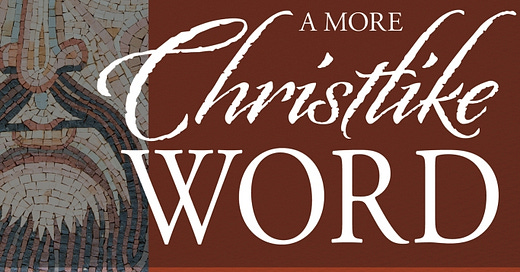Book Review: A More Christlike Word: Reading Scripture the Emmaus Way
Received a copy from Speakeasy in exchange for my unbiased review.
One of the central questions that many Christians grapple with is, “how do we read the Bible?” In particular, how do we read texts that are problematic or “toxic?” In some Christian circles, the response is to view the Bible as the infallible word of God and to view every word as something to be taken as “literal.” Brad Jersak in, A More Christlike Word: Reading Scripture the Emmaus Way" points to why this view of scripture causes even more problems and how to rectify it.
Jersak points out that this view of the Bible as the literal, infallible Word of God, decenters Jesus Christ. He points out, “…the Bible clearly says” generally strips our reading of the illumination of the Spirit, the gospel of Jesus Christ, and the heart of our heavenly Abba. Thus, our life-giving message is reduced to a dead letter “ (114).
Literalism also places limits on Jesus and the text, it doesn’t allow the text to speak for itself. He explains: “Literalism…presupposes, assumes, and presumes to tell you what the text must do and cannot do… Literalism is often the terminus for what the text has to say and derides further spiritual exploration as “spiritualizing.” (115)
Jersak is quick to point out that he very much loves reading and studying the Bible. He is no way asserting that Christians should disregard the Biblical text. Instead, he advocates for a fuller, more holistic reading of the text, one based on how the Patristic Fathers and even Jesus and his early followers viewed the text.
The Bible as the literal, infallible word of God is a modernist interpretation of the Bible and it often flattens the Biblical discourse. Instead of providing space for the Bible and the Holy Spirit to speak to us, it instead makes a set of presumptions that predetermine and limit the ways in which Scripture can be interpreted and thus the ways it can speak to us.
He acknowledges that of course, we all bring prior assumptions and biases to the text, and in fact, getting read of all predispositions is not necessarily something that one can or should achieve. He writes: “Indeed, reading Scripture as Scripture actually requires a predisposition, rooted not in our personal temperament or our theological structures, but in Christ and his gospel.” (117). But some of our predispositions, imposed on Scripture, actually serves to distort it.
He points to, for example, how a literalist reading of Revelation’s “lake of Fire” causes us to reject or misinterpret other scriptures such as 1 Corinthians 15;22, because a literalist reading of scripture assumes that the authors cannot be in disagreement. As a result, Paul’s radical inclusive message is distorted and his message is transformed into something else entirely.
So if not taking a literalist approach to Biblical interpretation, how then should Christians interpret the Bible? Jersak points out that the early Church Fathers did not interpret the Bible in the same way that modern literalists do. He points out that their understanding of interpreting the Bible “literally” included textual analysis, genre analysis, and lexical exegesis.
Church fathers such as Origen believed it necessary to separate between actual history and fictitious history, which may not have been true in the literal, historical sense but yet pointed to larger historical truths. He believed in embracing moral and spiritual readings of the text.
Jersak explains that a moral reading answers the following questions: “How will this passage nourish my growth as a follower of Jesus Christ? That is, “How will it transform me so that the truth of my being (the image of Christ) becomes the way of my being (the likeness of Christ)?” (132).
A spiritual reading “follows Jesus’s promise and example that the whole of “Moses and the Prophets and all the Scriptures” anticipate Christ, his gospel, his suffering and death, and his resurrection and reign.” (134)
Jersak also advocates for a Christ-centered reading of the whole Biblical text. While he does address some concerns that this could lead to appropriation, I am not necessarily sure I buy his arguments. He points out that this reading of the Old Testament is not a non-Jewish interpretation since Jesus and his Jewish disciples/followers serve as the ones guiding us. He also argues that “it is a mistake to imagine the Old Testament, as such, waiting for us to lay a Christ-lens over it, as if the Christ-directed focus were not already there.”
I am concerned that the idea that Christ is within the text of the Old Testament sounds like it can give ammunition to antisemitic Christians who claim that Jewish people are intentionally obscuring and distorting the Old Testament to avoid accepting Jesus as Messiah. Obviously, Jersak does not endorse that interpretation.
Also, Jesus’ Jewishness may contradict some of the theologies that later Christians hold dear. For instance, Jesus and early followers of Jesus may not have understood him to be part of the Trinity, a concept fully formed and developed much later. One can argue that reading that into the Old Testament is not honoring Jesus and the early followers' Jewishness but rather later Christian doctrinal interpretations.
Despite some of my reservations, I think this book provides a fruitful discussion on how to read the Bible without turning to literalism and infallibility. While I may not be in 100 percent agreement with everything he writes, his book still provides discussion around much-needed alternatives to Biblical literalism.



